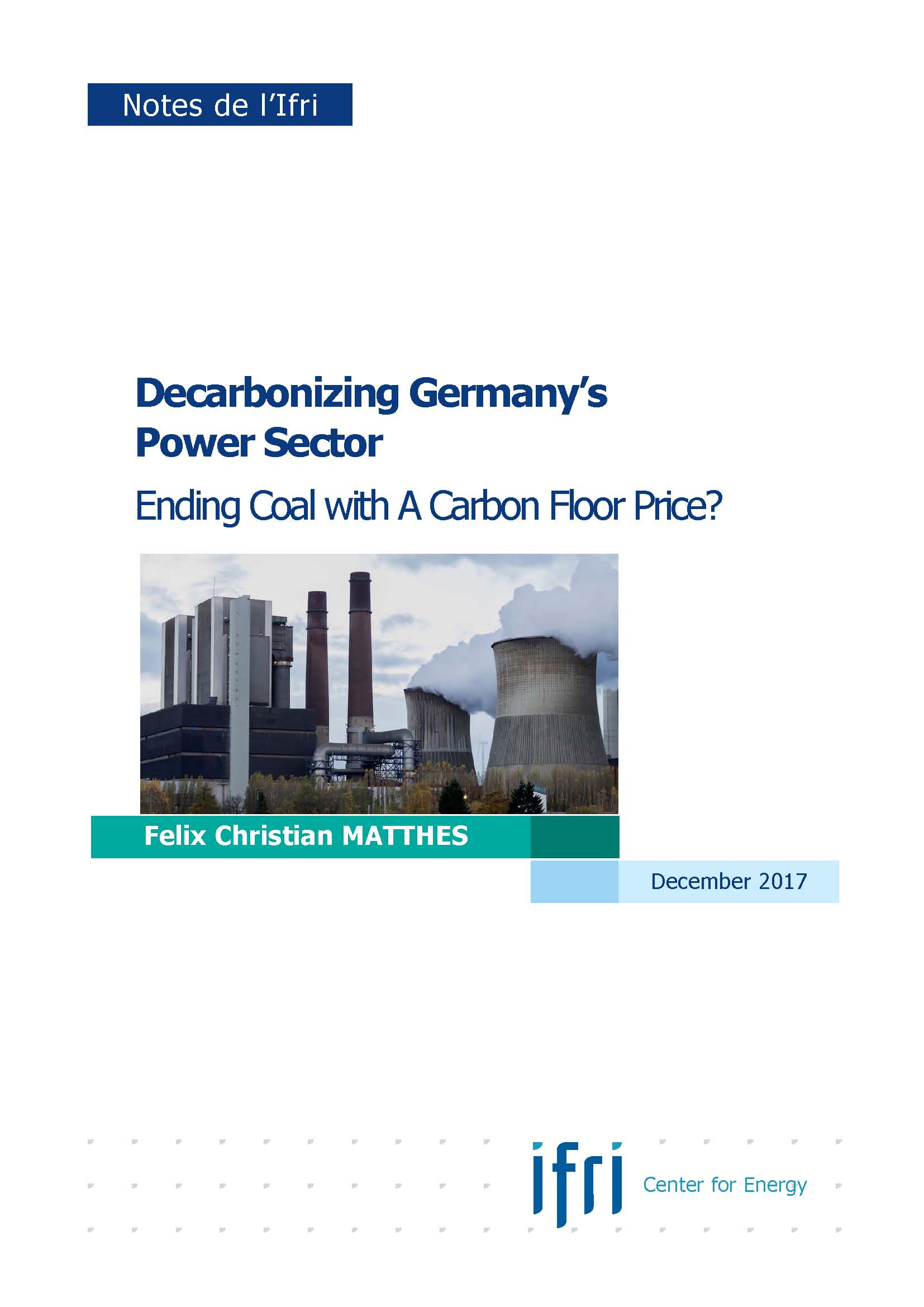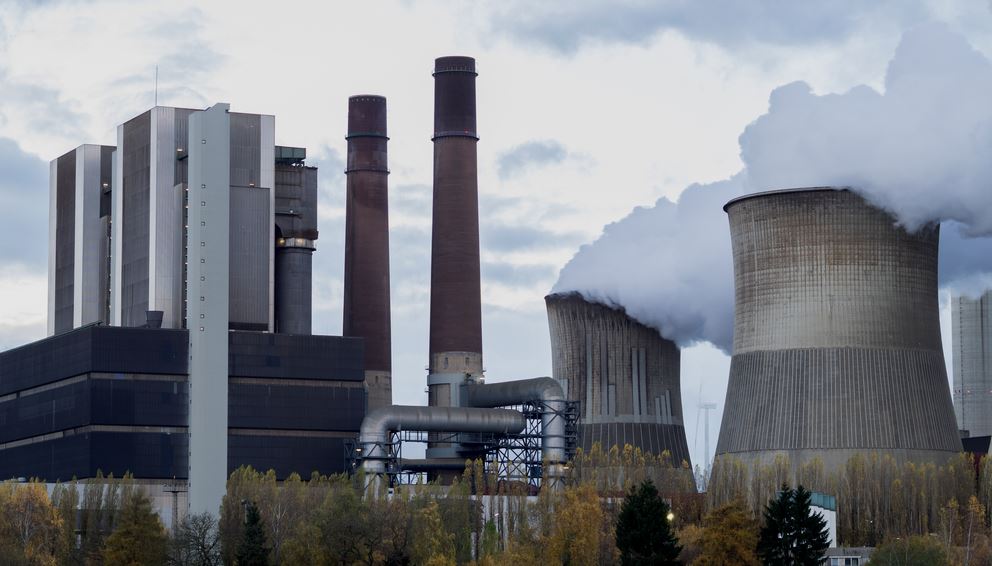Decarbonizing Germany’s Power Sector: Ending Coal with a Carbon Floor Price?

Germany has a long tradition of climate policy programmes with ambitious greenhouse gas emission reduction targets and comprehensive climate and energy policy packages.
This target-driven policy approach is, however, increasingly facing challenges due to the lack of progress on greenhouse gas emission reductions in key sectors, i.e. the power, the transport and the building sector.

Without additional policies and measures Germany is set to miss its 40% emission reduction target for 2020 by 7 to 8 points and will be off-track to reach its emission reduction targets for 2030, which were specified for the first time in 2016 for the different sectors in Germany’s Climate Action Plan 2050.
Although the German power sector has experienced strong growth in power generation from renewable energy sources, the sector’s greenhouse gas emissions have almost stagnated in recent years. This is essentially due to the large coal-based power generation fleet maintaining its production levels and surplus generation was increasingly exported to neighbouring countries. The cross-border exchange of electricity was more or less balanced at the turn of the millennium; currently the net electricity exports amount to a share of 8 % to 9 % of total production.
The lack of emission reductions in the power sector has triggered an increasing political debate on coal phase-out since 2014, which led to a first round of forced decommissioning of lignite-fired power plants that was, however, linked to significant compensation payments. Discussions about the next steps of the coal phase-out have been contentious in the recent coalition talks for building a new government after the 2017 federal election; these steps will definitely remain on the political agenda in the years ahead.
Germany’s system of energy taxation is complex and inconsistent from the perspective of (implicit) carbon pricing; it needs updating and streamlining to the recent challenges and future needs in the framework of the energy transition (broader incentives for emission reductions, sector integration, etc.). The interest in carbon pricing has grown significantly in recent years, which has created a window of opportunity for concerted action on carbon pricing between Germany and its neighbours.
With a view to the French efforts to complement the traditional energy taxes with a CO2 adder a closer cooperation and convergence of energy taxation approaches could add significant value to the climate and energy policy of both countries. Introducing a carbon floor price for power generation within the European Union Emissions Trading System – EU ETS) should, however, be a key priority at least for the countries that are interlinked by the Central Western European regional power market.
Such a regional price floor would increase the integrity and consistency of greenhouse gas emission reduction efforts in the participating countries and make a significant contribution to the emerging coal phase-out in countries such as Germany, France, the Netherlands and Denmark. If static and dynamic effects are considered, carbon price levels of € 15 to € 25 would trigger significant emission reductions and price levels of € 30 to € 35 very significant emission reductions. However, the introduction of a regional carbon floor price for electricity generation faces legal, technical and political challenges.
- For Germany restrictive legal constraints need to be considered which would potentially require new approaches for harmonization of carbon pricing outcomes.
- Identifying accountable mechanisms for compensating indirect CO2 costs for electricity-intensive industries (20-25 % of industrial electricity consumption in Germany) that are also available in the framework of a carbon price not triggered by the EU ETS will be crucial (the British model of a carbon floor price is the most promising model here).
- Dealing with political narratives about winners and losers of a floor price is a key prerequisite for its successful implementation.
With respect to the existing and emerging political narratives it will be important to frame a carbon floor price as part of a larger package:
- making the initiative part of a broader and accountable energy policy package that includes carbon pricing as part of transformative efforts towards a sustainable energy system and deep decarbonization (phase-out of coal and nuclear);
- making carbon pricing efforts part of a pro-European narrative but delinking it from highly controversial and high politics issues like European funding mechanisms; and
- making the carbon price floor part of a high-level initiative that creates a robust policy arena.
Download the document to read the full text.

Available in:
Regions and themes
ISBN / ISSN
Share
Download the full analysis
This page contains only a summary of our work. If you would like to have access to all the information from our research on the subject, you can download the full version in PDF format.
Decarbonizing Germany’s Power Sector: Ending Coal with a Carbon Floor Price?
Related centers and programs
Discover our other research centers and programsFind out more
Discover all our analysesPlacing the EU on a Warfare Footing: Energy and Raw Materials Priorities for 2026
The year 2025 has confirmed that one must prepare for much worse in the field of geopolitics and geoeconomics as the intensity and frequency of shocks increase and as the European Union (EU) has no more stable flanks now that crises with the United States (US) become so frequent and reveal a systemic rift. In the world, barriers to trade multiply and dependencies are weaponized.
Brazil One Year Away from the October 2026 General Elections
Brazil’s general elections will be held on October 4, 2026, to elect the president, vice-president, members of the National Congress, governors, deputy governors and state legislative assemblies. For the presidential and gubernatorial elections, a second round will be held on October 25 if no candidate obtains a majority of the votes in the first round.
COP30: An Inflection Point for Climate Action and Governance
The 30th Conference of the Parties (COP30), opening in Belém, Brazil, on November 10th 2025, convenes at a perilous moment.
The Strategic Dimension of Skills in the Clean Industrial Deal
In the competitiveness and energy transition battles, the European Union (EU) must master a determinant factor: skills.










